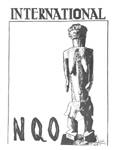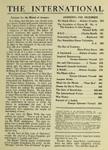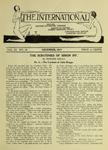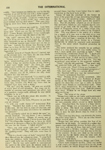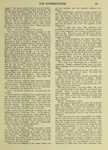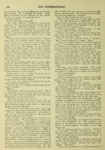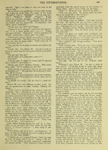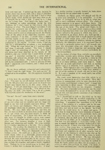100th
MP

|
THE
100th
MONKEY
PRESS |
|
|
|
Limited Editions by Aleister Crowley & Victor B. Neuburg |
|
Bibliographies |
|
Download Texts
»
Aleister
Crowley
WANTED !!NEW!!
|
|
THE CONDUCT OF JOHN BRIGGS |
|
»» Download Text «« |
Image Thumbnails |
|||
|
Title: |
The Conduct of John Briggs |
|
||
|
Type of Media: |
Periodical. |
|||
|
Name: |
The International: A Review of Two Worlds. |
|||
|
Issue: |
Volume XI, Number 12. |
|||
|
Date: |
December 1917. |
|||
|
Publisher: |
International Monthly, Inc. |
|||
|
Published At: |
New York. |
|||
|
Pages: |
Pages 355-360. |
|||
|
Price: |
15 Cents. |
|||
|
Remarks: |
One of numerous "Simon Iff" stories written by Crowley. Published under the pseudonym of Edward Kelly. |
|||
|
Author’s Working Versions: |
|
|||
|
Other Known Editions: |
|
|||
|
Comments by Aleister Crowley: |
In January 1918, I published a revised version of the "Message of the Master Therion" and also of the "Law of Liberty", a pamphlet in which I uttered a panegyric upon the Law as the key to freedom and delight. (To get rid of the subject I had better mention here the other magical essays which appeared in The International: "Cocaine", "The Ouija Board", "Concerning Death", "Pax Hominibus Bonae Voluntatis", "Geomancy", "Absinthe", "De Thaumaturgia", "Ecclesiae Gnosticae Canon Missae". Of these, Liber XV, its scope and purpose, I have already described at length.) The point which I wish to bring out is that despite the constraint imposed upon me by the requirements of public taste, I succeeded in proclaiming the Law to a wide audience of selected readers, explaining its main principles and general import in straightforward language, and also in putting over a large amount of what was on the surface quite ordinary literature, but implying the Law of Thelema as the basis of right thought and conduct. In this way I managed to insinuate my message perhaps more effectively than could possibly have been done by any amount of visible argument and persuasion. The Scrutinies of Simon Iff are perfectly good detective stories, yet they not only show a master of the Law as competent to solve the subtlest problems by considerations based upon the Law, but the way in which crime and unhappiness of all sorts may be traced to a breach of the Law. I show that failure to comply with it involves an internal conflict. (Note that the fundamental principle of psychoanalysis is that neurosis is caused by failure to harmonize the elements of character.) The essence of the Law is the establishment of right relations between any two things which come into contact: the essence of such relations being "love under will". The only way to keep out of trouble is to understand and therefore to love every impression of which one becomes conscious. — The Confessions of Aleister Crowley. New York, NY. Hill and Wang, 1969. Page 828. ______________________________
We may now return to the subject of the initiation itself. Besides my work of proclaiming the Law to the profane and expounding it to the aspirant, I was set the task of analysing it in such a way as to illuminate the most advanced. During most of the winter I gave most of my spare time to the creation of literature which corresponded nobly with this three fold labour. I wrote the twelve stories Simon Iff in America. These were a continuation of the previous The Scrutinies of Simon Iff, but constructed for the most part on mere mechanical principles. I may even compare them to chess problems. The general method was to think of a situation as inexplicable as possible, then to stop up all chinks with putty, and having satisfied myself that no explanation was possible, to make a further effort and find one. I find it hard to consider this sort of thing as serious literature, and yet so ineradicable is the artistic instinct in me that the Old Adam peeps out sufficiently often to remove these stories from the category of jeux d'esprit. In particular, the story "Suffer the Little Children", whose setting is in Florida as I knew it, flames so fiercely with the passion excited in me by the conditions which I found there, a passion which I cannot fairly describe as pity, scorn, disgust, indignation, or even any combination of these, that I believe this tale may stand like the broken statue of Osymandias, in the eyes of a new civilization, as a witness of the tyranny and abomination which Christians have taught us to associate with the name of Christ. It is at least an extremely accurate study of life in Florida; the accuracy is guaranteed by the acuteness of the suffering of the observer. One does not see children vivisected before one's eyes without receiving an impression, and the emotion which in ordinary cases might obfuscate and mislead the looker-on was in my case transformed into an ideal stimulant of clear-sightedness. I felt intensely that I had to have all my wits about me in order to expose the atrocity of the abominations which I was compelled to witness. The brilliance of the story is striking evidence of the fierceness of my reaction against the conditions of the backwoods life of the United States. One of the chief reasons for the inexpressible intensity of my feeling is doubtless that the nameless tortures which I saw inflicted as a mere matter of routine upon women and children as such broke open the sepulchre in which I had long since buried my own sufferings at the hands of Evangelicalism and released these fetid, noxious and malignant spectres once more to prey upon my mind. — The Confessions of Aleister Crowley. New York, NY. Hill and Wang, 1969. Page 830. ______________________________
New Orleans and San Antonio are said to be the only two towns in the United States which possess souls of their own. That of New Orleans was already being driven out under my eyes, and I dare say that by this time the work of destruction is complete. Probably San Antonio has shared its fate. The most depressing feature in the country is the uniformity of the towns. However singular the geographical situation and its topographical peculiarities, the possibilities of beauty have been nullified by the determination of the people to do everything just right, according to the measure in fashion. Wherever one is, sooner or later, one gets tired of one's surroundings. In Europe, the cure is easy. One toddles along to the next place sure of finding some novelty. In America, however far one goes, the same hideous homogeneity disappoints one. The relief conferred by the old quarter of New Orleans threw me instantly into an ecstasy of creative energy. I wrote day and night continuously --- poems, essays and short stories. My principal invention was the detective "Simon Iff" whose method of discovering the solution of a problem was calculation of the mental and moral energies of the people concerned. I wrote a series of six stories about his exploits and followed it by The Butterfly Net or the Net, a novel in which he is a secondary character. In this novel I have given an elaborate description of modern magical theories and practices. Most of the characters are real people whom I have known and many of the incidents taken from experience. — The Confessions of Aleister Crowley. New York, NY. Hill and Wang, 1969. Page 777. ______________________________
The misery which I underwent at this time had done much to cloud my memory. I do not clearly remember, for example, my reasons for going to New Orleans almost immediately after returning from Lake Pasquaney. It was my last glimpse of beauty for a long while. The old French-Spanish quarter of the city is the only decent inhabited district that I discovered in America. From the architecture to the manners of the people, their clothes, their customs and their cookery, all was delightful. It was like being back in Europe again with the added charm of a certain wildness and romance; it was a civilization sui generis, with its own peculiar adornment in the way of history. It enabled me to realize the spirit of the Middle Ages as even the most remote and time-honoured towns of Europe rarely do. I took a room conveniently close to the Old Absinthe House, where one could get real absinthe prepared in fountains whose marble was worn by ninety years' continual dripping. The result was that I was seized by another of my spasms of literary creation, and this time, the definite sexual stimulus which I had imagined as partly responsible for such attacks was, if not absent, at least related to an atmosphere rather than to an individual. It lasted, if I remember rightly, some seventeen days. I completely lost track of the properties of times and place. I walked over to the Absinthe House in my shirt sleeves on one occasion without being in the slightest degree aware of the fact. My best work was an essay "The Green Goddess", descriptive of the Old Absinthe House itself in particular, and the atmosphere of the quarter in general. It may be regarded as the only rival to "The Heart of Holy Russia" for literary excellence and psychological insight. I wrote also The Scrutinies of Simon Iff, a series of six more or less detective stories; two or three less important essays; some short stories, of which I may mention "Every Precaution" for its local colour; and all but the last two or three chapters of my first serious attempt at a long novel, The Net. — The Confessions of Aleister Crowley. New York, NY. Hill and Wang, 1969. Page 817. |
|||
|
Reviews: |
|
|||
